This Doesn't Look Very Good! Wasps
-
Recently Browsing 0 members
- No registered users viewing this page.
-
Topics
-
-
Popular Contributors
-
-
Latest posts...
-
2
Community Australian Tourist Found Dead After Massage on Koh Samui
the whole report seems to describe exactly what happened and appears to be the truth ... or maybe is there something missing? -
2
Accident Drunk Lorry Driver Crashes into Toll Booth in Samut Prakan, Gas Cylinders Scatter and Leak
Multiple entry points, double vision due to alcohol - looks like he divided by two to split the difference and got it wrong. Best advice I can offer is to close one eye before you do the math.- 1
-

-
4
Tourism Thailand Rethinks Tourism Strategy After 34% Plunge in Chinese Arrivals
Nearly 17M in six months is still too many for Thailand. It clogs the place up. They should be aiming for a sustainable 20M per year or less, max 1M Chinese. -
34
Community Child Hospitalised After Consuming Cannabis-Infused Gummies Left Behind at Birthday Party
Same happened just before the vape ban. -
1
Life Coaches and Other Professional Time Wasters ~ Who’s Buyin’ This Minging Rubbish?
How do you feel about the colonic cleansing coaches? You know, the ones who offer to help you with a deep colon cleaning and can offer recommendations on the solutions to use and the insertion of the hose. -
2
Crime Swedish Man & Thai Woman Arrested for Cocaine Possession & Distribution in Phuket
The picture made me sad as he really seem to love her true
-
-
Popular in The Pub














.thumb.jpeg.42eea318e3350459f0aaaa5460326bca.jpeg)


Recommended Posts
Create an account or sign in to comment
You need to be a member in order to leave a comment
Create an account
Sign up for a new account in our community. It's easy!
Register a new accountSign in
Already have an account? Sign in here.
Sign In Now